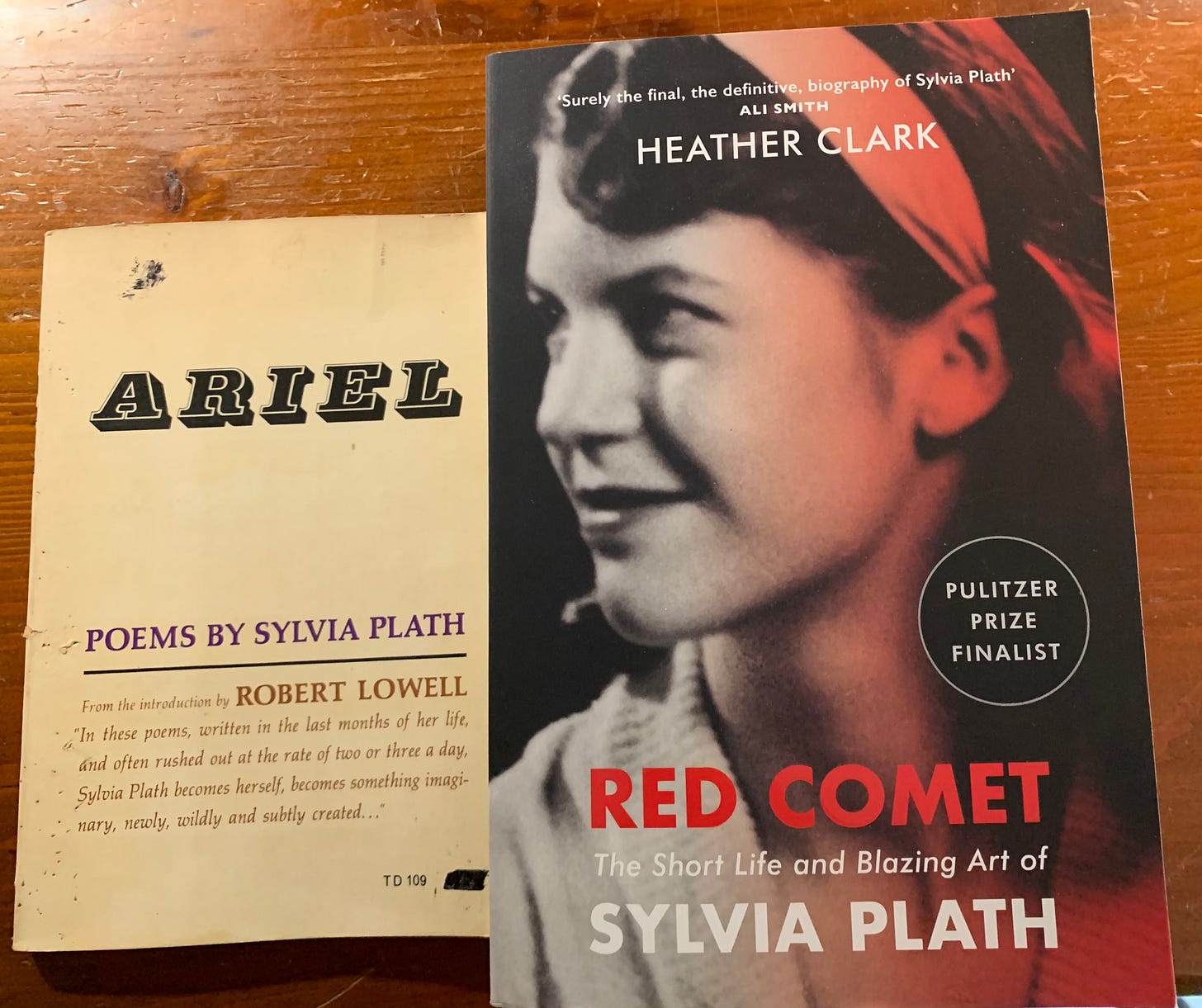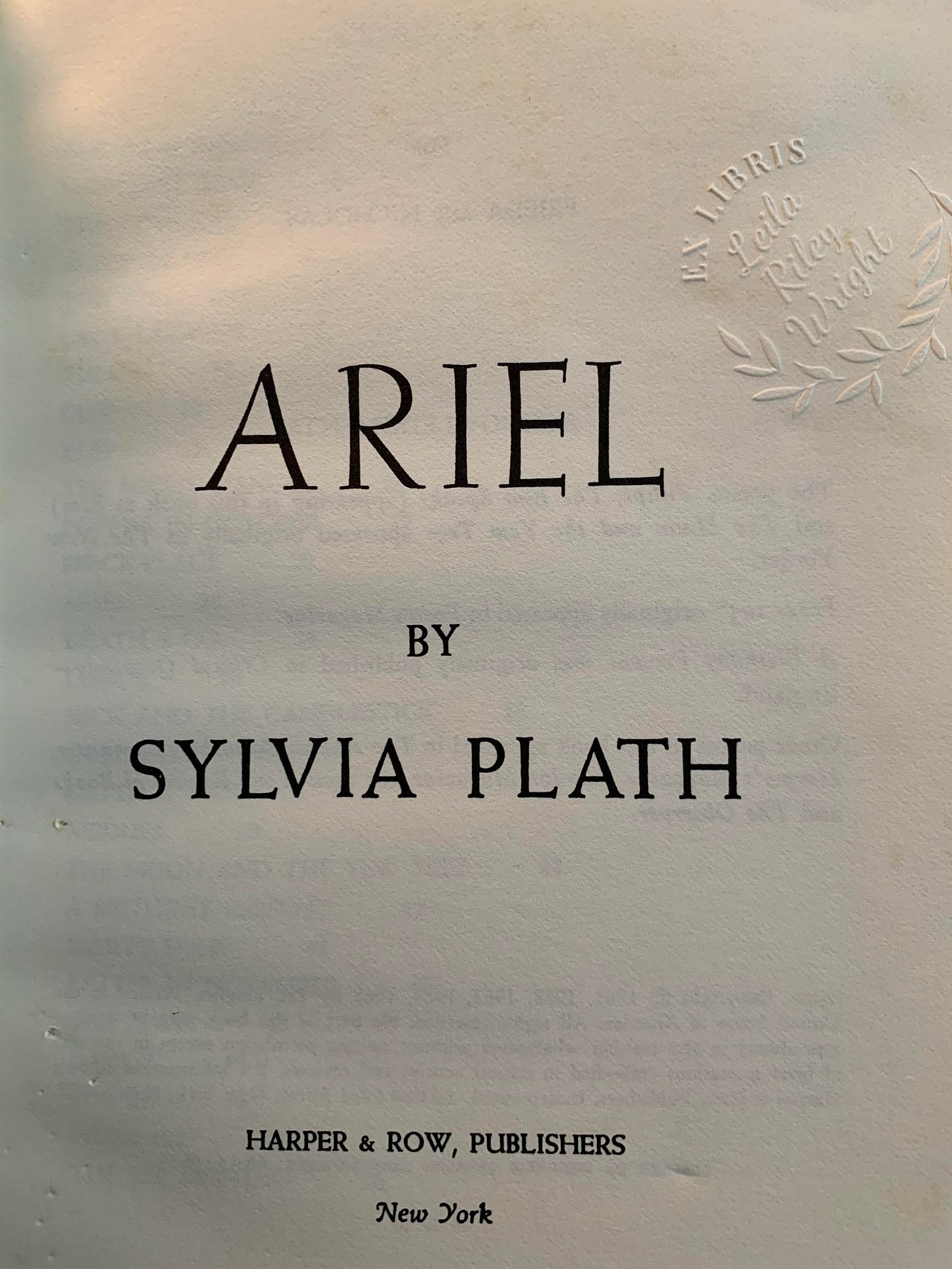Don’t Loan
Holding Sylvia Plath’s Ariel close.
Continuing with literary biographies, I’ve just started reading Red Comet: The Short Life and Blazing Art of Sylvia Plath. The biographer, Heather Clarke, had me at the prologue, particularly where she describes the dispiriting address Democratic Presidential Candidate Adlai Stevenson—“the liberal darling of his day”—gave at Sylvia’s 1955 Smith College commencement ceremony:
The best way these brilliant graduates could contribute to their nation, Stevenson said, was to embrace “the humble role of housewife, which, statistically, is what most of you are going to be whether you like the idea or not ...”
With those threatening words ringing in her ears, Sylvia attempted to forge a life as poet, woman, wife, and mother.
But that’s as far as I am with Red Comet, because once I started getting into the main part of the book, I realized I needed Sylvia’s poetry nearby. I found my precious copy of Ariel, picked up in a Bay Area bookstore in the early 1990s. It is the original, Ted Hughes-organised version from 1965. In 2004, The Restored Edition: Ariel was released in the exact arrangement as left by Sylvia at the time of her death. Ted’s version may have the better vehicle for bringing the reader directly into the “sarcastic, funny, grotesque voice that dominates Ariel” (Meghan O’Rourke, Slate). Frieda Hughes’ forward to the 2004 edition thoughtfully details her father’s process in forming the original collection and her wish for her mother to be remembered for her art, not her suicide.
Recently my friends Natalie and Andrew gave me a customized book embosser which I took out to mark Ariel with. That’s when I saw that the book had already been claimed by its previous owner, Dorothy Klotovich, with the admonition “Don’t Loan.” Excellent advice, Dorothy.
I embossed Ariel and began to reacquaint myself with the poems:
But in twenty-five years she’ll be silver,
In fifty, gold,
A living doll, everywhere you look.
It can sew, it can cook,
It can talk, talk, talk.
- From ‘The Applicant’
Gut punch.
Thirty-five years ago, I had a set of tapes, recordings of Sylvia reading her poetry, including poems from Ariel. You can hear these now, remastered, on YouTube. Listening to Sylvia read in her deep, dramatic voice makes me think of the ghost of Cathy, outside the window, begging to be let in.
So, I travel away from the pleasure and privilege of Shirley Hazzard’s lovely life to the fraught genius of Sylvia Plath and her brave endeavors to exist beyond the limited structures of the culture while wrestling with clinical depression.
Wish me well.




Lovey post, Leila. It prompted a return to reading Sylvia's, Mad Girl's Love Song. How beautiful is that poem as is the embossed page you created. At the risk of sounding poetic, the embossing is like the impression left by a loving heartbeat on a page that belongs to a much admired artist's work.
If you, Caroline and others are aiming to read a poem monthly, weekly or otherwise, may I recommend a couple others that, in my opinion, were emotionally stirring, dare I say, brilliant:
The Red Dress, by Myra Schneider and The Japanese Wife by Charles Bukowski. Contemporary Canadian poet, Evelyn Lau, also knocks them out of the ballpark. I think you'd like some of her themes.
I think I mentioned to you before that I’m reading a poem a day this year - well two of them this month have been about Sylvia Plath (though neither by her). One was called Against Extremism, which was very critical of her daring to be critical of the establishment in any way (wish I could remember the name of the dinosaur who wrote it). The other was called 11th February 1963 and was about the strange coincidence that this day marked the release of The Beatles ‘Abbey Road’ as well as the day Sylvia Plath took her own life. She seems to be making an appearance in my life in all sorts of ways at the moment so I will have to add some of her work to my tbr!